Whitewater Inquiry, 1993-2000
Enlarge text Shrink text- Work cat.: 94096246: Gross, M.J. The Great Whitewater fiasco, c1994.
- NY Times, Sept. 21, 2000(Headline: "Whitewater Inquiry Ends; A Lack Of Evidence Is Cited In Case Involving Clintons")
- NY Times index(Whitewater Case, Whitewater Development)
- SCORPIO Mags file(Whitewater Inquiry, Whitewater case--in order of use)
- Washington Post index(Whitewater Case)
The Whitewater controversy, Whitewater scandal, Whitewatergate, or simply Whitewater, was an American political controversy during the 1990s. It began with an investigation into the real estate investments of Bill and Hillary Clinton and their associates, Jim and Susan McDougal, in the Whitewater Development Corporation. This failed business venture was incorporated in 1979 with the purpose of developing vacation properties on land along the White River near Flippin, Arkansas. A March 1992 New York Times article published during the 1992 U.S. presidential campaign reported that the Clintons, then governor and first lady of Arkansas, had invested and lost money in the Whitewater Development Corporation. The article stimulated the interest of L. Jean Lewis, a Resolution Trust Corporation investigator who was looking into the failure of Madison Guaranty Savings and Loan, also owned by Jim and Susan McDougal. Lewis looked for connections between the savings and loan company and the Clintons, and on September 2, 1992, she submitted a criminal referral to the FBI naming Bill and Hillary Clinton as witnesses in the Madison Guaranty case. Little Rock U.S. Attorney Charles A. Banks and the FBI determined that the referral lacked merit, but Lewis continued to pursue the case. From 1992 to 1994, Lewis issued several additional referrals against the Clintons and repeatedly called the U.S. Attorney's Office in Little Rock and the Justice Department regarding the case. Her referrals eventually became public knowledge, and she testified before the Senate Whitewater Committee in 1995. David Hale, the source of criminal allegations against the Clintons, claimed in November 1993 that Bill Clinton had pressured him into providing an illegal $300,000 loan to Susan McDougal, the Clintons' partner in the Whitewater land deal. The allegations were regarded as questionable because Hale had not mentioned Clinton in reference to this loan during the original FBI investigation of Madison Guaranty in 1989; only after coming under indictment himself in 1993, did Hale make allegations against the Clintons. A U.S. Securities and Exchange Commission investigation resulted in convictions against the McDougals for their role in the Whitewater project. Jim Guy Tucker, Bill Clinton's successor as governor, was convicted of fraud and sentenced to four years of probation for his role in the matter. Susan McDougal served 18 months in prison for contempt of court for refusing to answer questions relating to Whitewater. Neither Bill Clinton nor Hillary Clinton were ever prosecuted, after three separate inquiries found insufficient evidence linking them with the criminal conduct of others related to the land deal. The matter was handled by the Whitewater Independent Counsel, Republican Kenneth Starr. The last of these inquiries came from the final Independent Counsel, Robert Ray (who replaced Starr) in 2000. Susan McDougal was granted a pardon by President Clinton before he left office.
Read more on Wikipedia >
 Topic
Topic






